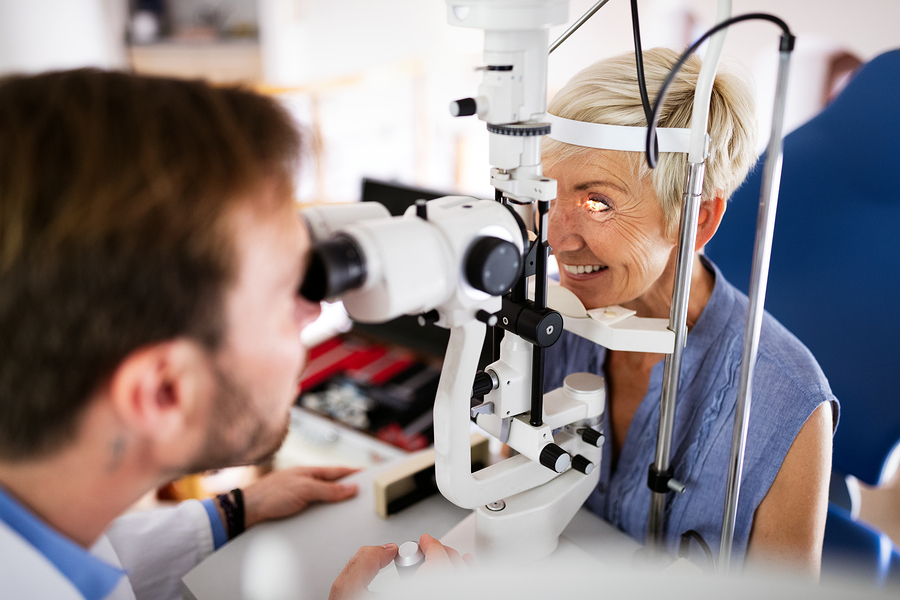Why eye health should not be overlooked
Most of us are aware of how to keep our bodies healthy but eyes are too often overlooked. Here we look at why regular eye checks are so important.
How often should our eyes be checked?
The Royal National Institute of Blind People (RNIB) reports that 12.5 million people a year fail to have a regular eye test.
Optometrist Karen Sparrow recommends that we see an optometrist every 2 years, even if we don’t need glasses. And if we do wear glasses or start to have problems with our eyes then we should have them tested more often.
Regular eye tests are a good way of detecting early signs of some of the main causes of severe sight loss. And along with assessing the health of our eyes, an eye examination can also detect any underlying health conditions, such as high blood pressure or diabetes.
“In many cases, conditions such as cataracts, glaucoma, diabetic eye disease, and myopic degeneration are treatable if detected early” says Karen.
“Older people in particular are unaware of their own potential health risk and assume it is safe to wait until they experience symptoms before having their eyes checked”, says the RNIB. “But by then it can be too late. It is, therefore, crucial for people aged 60 and over to attend regular eye checks.”
Leading a healthy lifestyle can help with eye health
The Eyecare Trust warns that poor lifestyles are having an enormous impact on eye health in the UK and according to official figures the number of people in the UK with sight loss will double to 4 million by 2030.
But it’s not all bad news. The Eyecare Trust’s Chairman, Iain Anderson tells us “in some cases following a healthy diet, exercising regularly and cutting out alcohol and cigarettes will restore vision that is already in decline, so it’s never too late to change”.
Which foods are good for eyes?
Certain fruits and vegetables containing lutein and zeaxanthin may help protect against some eye diseases, such as macular degeneration and cataracts, later in life. Examples of these are:
- Blueberries
- Spinach
- Broccoli
- Sweetcorn
- Orange and yellow peppers
- Kiwi fruit
- Grapes
- Oranges
- mangoes
In addition to these, foods that contain antioxidant vitamins A, C and E are said to promote good eye health. These can be found in many different fruit and vegetables along with dairy products, eggs, nuts and seeds.
What else can we do for our eyes?
Along with maintaining a healthy lifestyle there are some other things we can consider doing to help keep our eyes in good condition.
Take a break from your screen
Many of us spend a lot of time on a screen of one sort or another so it is vitally important that we make ourselves as comfortable as possible when we use one, including our eyes.
Make sure to take regular breaks – about 5 minutes every hour and remember to blink more often. Try closing your eyes fully several times an hour and look away from the screen, across the room or out of the window, every 20 minutes so that you can rest your eyes.
Contact lens wearers
It is important to follow the guidelines your optometrist gives you as most problems with wearing contact lenses are due to poor cleaning or wearing the lenses for too long.
If you wear eye make-up with your contact lenses then your lenses should be put into the eye first before applying it. Hypoallergenic formulas are a good idea as they are less likely to irritate your eyes and it’s best to avoid waterproof mascaras as, if particles get into your eye, they can stick to your contact lens and irritate your eye.
Don’t forget the grandchildren
Karen Sparrow highlights the need for children to have regular eye tests too. “Children should be taken for a full eye examination at around 3 to 4 years, preferably before they start school, especially if other family members wear glasses or have eye problems. “Many common childhood eye problems can be treated if caught at an early age. And eye tests are free through the NHS for children up to the age of 16.”
So don’t delay, book an eye test today!
Disclaimer
All content on Silversurfers.com is provided for general information only, and should not be treated at all as a substitute for the medical advice of your own doctor or any other health care professional. Silversurfers will not be responsible or liable for any diagnosis made by a user based on the content on www.silversurfers.com and we are also not liable for the content of any external websites or links from or to Silversurfers to any other websites. Please always consult your own doctor if you’re in any way concerned about any aspect of your health.
Melina - Assistant Editor
Latest posts by Melina - Assistant Editor (see all)
- By yourself at Christmas this year? Tips on how to manage alone - December 16, 2024
- The Silversurfers, just for fun, Christmas Quiz! - December 14, 2024
- 10 potential hazards for pets at Christmas - December 10, 2024
- Christmas Spiced Blueberry Panettones - December 1, 2024
- Three must have toys of the late 60’s - November 24, 2024




















